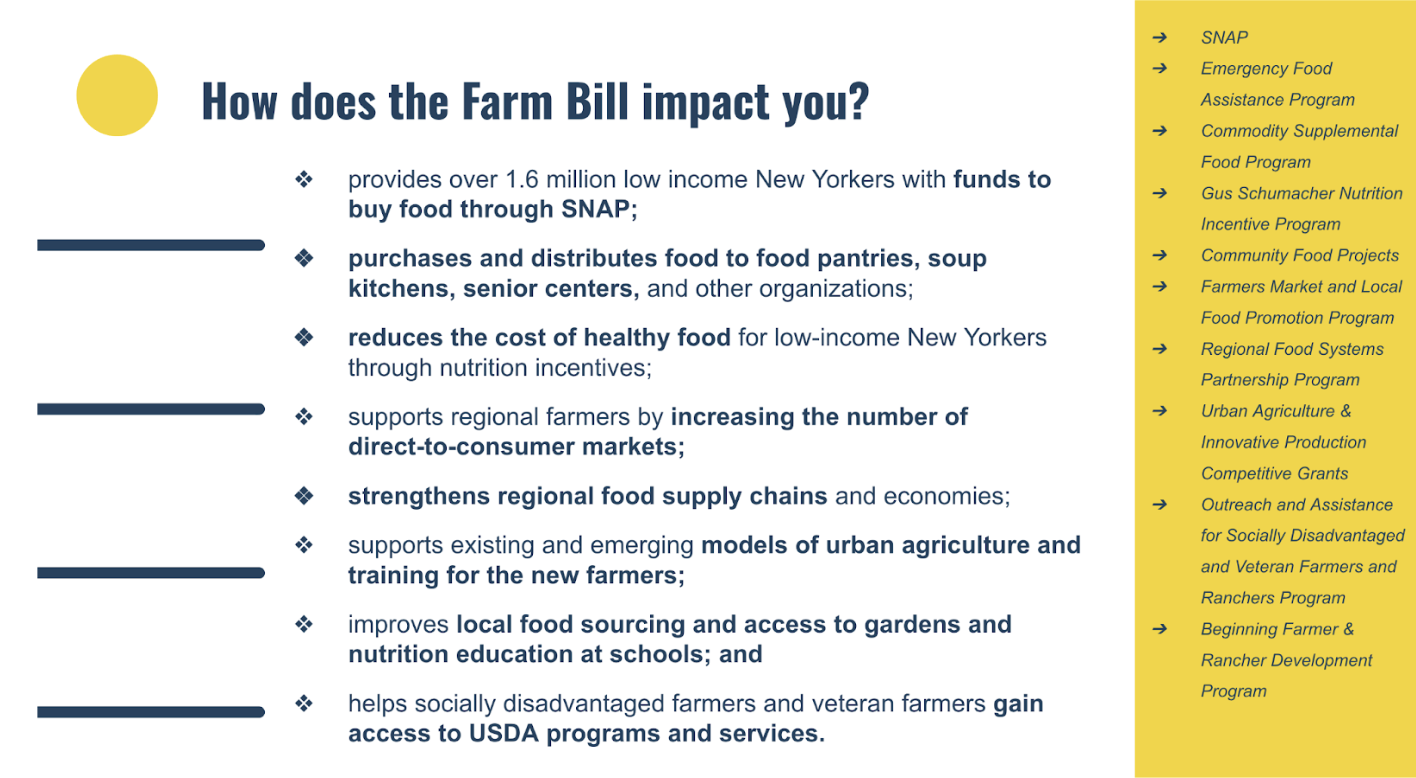We finally have some action on the Farm Bill!
As a refresher, the Farm Bill is federal legislation that shapes virtually every aspect of the U.S. food and agricultural system—what kind of food farmers grow, how much it costs, who has access to land and resources to farm, and who benefits.
The Farm Bill is usually renewed every five years and was up for reauthorization in September 2023. However, when lawmakers disagreed over funding they instead extended the 2018 Farm Bill and is now set to expire in September 2024.
In May, the House & Senate Agriculture committees released two competing visions for the next Farm Bill.
House Committee on Agriculture Draft:
The House Agriculture Committee held markup and then after 12+ hours, voted the Farm, Food, and National Security Act of 2024 (HR 8467) out of committee on May 23 (i.e. when the committee meets to either accept, rewrite or veto the draft farm bill and vote on whether to move the bill out of committee to the floor of the chamber for a vote.). The legislative text raises significant concerns as it proposes that future Thrifty Food Plan benefit adjustments, the basis for SNAP benefit levels, be cost-neutral and removes protections on the usage of new climate funding for agriculture from the Inflation Reduction Act (IRA) currently tagged to incentivize climate-smart farm practices and more. For these reasons, and more, we oppose the House Agriculture Farm Bill proposal and would urge our Representatives to vote “No” on the bill when it goes to a floor vote. However, it is unlikely that there will be a floor vote in the House any time soon, as there isn’t enough support for the bill..
Senate Committee on Agriculture Draft:
Meanwhile, the Senate Agriculture Committee released a detailed section-by-section description of its farm bill proposal. Equity Advocates is pleased the proposal aligns with many of our priorities for the Farm Bill identified in partnership with Black Farmers United NYS and Food for the Spirit. It protects future Thrifty Food Plan adjustments, proposes to increase SNAP access for former foster youth, higher education students, repeal the lifetime ban on individuals with felony drug convictions from receiving SNAP; study the impact of allowing hot foods to be purchased with SNAP benefits; authorize a 10-year path for Puerto Rico to transition to SNAP after over 40 years of exclusion. The Senate proposal also enhances funding for food banks, the Gus Schumacher Nutrition Incentive Program, the Senior Farmers Market Nutrition Program, and urban agriculture investments to bolster food security, community resilience, and environmental sustainability. We may see some movement in the Senate in June, when ranking member of the Senate Agriculture Committee (SAC) Sen. John Boozman (R-AR) is expected to release his “framework” for the Senate farm bill debate in June.
Key Differences and Legislative Focus:
Land Stewardship and Farmer Training: The Senate proposal alone includes supports for farmers addressing climate change; increase and provide annual mandatory funding for the office of urban agriculture; more sub-grant funding opportunities for urban agriculture; better access to USDA farm programs at the local level; invests in community partnerships that have experience serving urban and underserved producers. Both House and Senate proposals would make the Community Compost and Food Waste Reduction pilot program permanent.
Invest in Community Food Infrastructure: The House included provisions to simplify the application process for the Local Agriculture Marketing Program (LAMP) and modest funding increases to local food access initiatives such as the Senior Farmers Market Nutrition Program and the Community Food Projects Program. The Senate proposes significant investments across the board such as to increase discretionary funding for LAMP and new provisions that make regional food hubs eligible for the program; and removing matching requirements across several programs. Both propose increases to the Community Food Projects, with the Senate version calling to double the funding from $5M to $10M.
Improve Accessibility of USDA Programs: The Senate outlines improvements to USDA operations to streamline services and enhance access for under-resourced organizations and farmers by removing match requirements for Farmers Market and Local Food Promotion Grants and Value-Added Producer Grants. These critical efforts are less emphasized in the House draft.
Increase Access to Food Assistance: The Senate bill aims to expand access to and protect future Thrifty Food Plan adjustments for the SNAP program, while the House draft would cut billions from SNAP with its mandate that future adjustments be cost-neutral. The House apparently using savings from the proposed SNAP cuts to increase funding for the Emergency Food Assistance Program and other commodity distribution programs. House and Senate proposals both expand access to SNAP for individuals with felony drug convictions and call for the USDA to study the impact of allowing hot foods to be purchased with SNAP benefits. Both also call for increased funding for the Gus Schumacher Nutrition Incentive Program, and the Senior Farmers Market Nutrition Program.
These differing visions underscore a broader debate on how best to support agricultural initiatives and nutrition programs, reflecting the divergent priorities of the Republican-led House and the Democrat-led Senate. As negotiations proceed, these proposals will play a crucial role in shaping the final legislation of the Farm Bill.
Take Action:
Call your House Representative and urge them to oppose Chairman Thompson’s Farm Bill. We’ve created an easy to use call script to make your voice heard effectively - taking 3 minutes to voice your opinion and share personal stories and data-driven arguments can make a real difference!
Visit our Farm Bill campaign website to read about the ways we are working to ensure the new Farm Bill actively promotes food sovereignty, racial justice, and equity and follow us on Instagram to stay up to date on how and WHEN you can take action!

